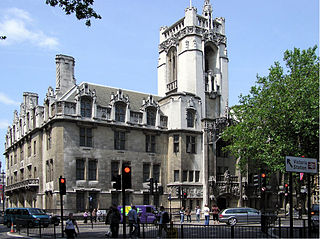Bail is a set of pre-trial restrictions that are imposed on a suspect to ensure that they comply with the judicial process. Bail is the conditional release of a defendant with the promise to appear in court when required.

The Woomera Immigration Reception and Processing Centre (IRPC) was an Australian immigration detention facility near the village of Woomera in South Australia. It was opened in November 1999 in response to an increase in unauthorised arrivals, which had exceeded the capacity of other detention facilities. It was originally intended to hold 400 people, however at its peak in April 2000 it had nearly 1,500 detainees. After ongoing public pressure in response to several well publicised riots from 2000, accusations of human rights abuses, and capacity issues, the centre closed in April 2003.
Australian immigration detention facilities comprise a number of different facilities throughout Australia. They are currently used to imprison people who are detained under Australia's policy of mandatory immigration detention. Asylum seekers detected in boats in Australian waters have been detained in facilities on the offshore islands of Nauru and Manus Island, previously under the now defunct Pacific Solution and under Operation Sovereign Borders.

Villawood Immigration Detention Centre (IDC) is an Australian immigration detention facility located in the suburb of Villawood in Sydney, New South Wales in Australia.

The Nauru Regional Processing Centre is an offshore Australian immigration detention facility, located on the South Pacific island nation of Nauru. The centre is operated by Broadspectrum on behalf of the Department of Home Affairs, a department of the Government of Australia that is responsible for immigration, citizenship and border control. The use of immigration detention facilities is part of a policy of mandatory detention in Australia.

The Department of Immigration and Border Protection (DIBP) was a department of the Government of Australia that was responsible for immigration, citizenship and border control. It has now been subsumed into the Department of Home Affairs, which combines its responsibilities with a number of other portfolios.
Cornelia Rau is a German citizen and Australian permanent resident who was unlawfully detained for a period of ten months in 2004 and 2005 as part of the Australian Government's mandatory detention program.

Immigration detention is the policy of holding individuals suspected of visa violations, illegal entry or unauthorised arrival, and those subject to deportation and removal in detention until a decision is made by immigration authorities to grant a visa and release them into the community, or to repatriate them to their country of departure. Mandatory detention is the practice of compulsorily detaining or imprisoning people seeking political asylum, or who are considered to be illegal immigrants or unauthorised arrivals into a country. Some countries have set a maximum period of detention, while others permit indefinite detention.

In jurisprudence, undue influence is an equitable doctrine that involves one person taking advantage of a position of power over another person. This inequity in power between the parties can vitiate one party's consent as they are unable to freely exercise their independent will.
The Department of Immigration and Multicultural Affairs and Indigenous Affairs was an Australian government department that existed between November 2001 and January 2006.

Escape from Woomera is an unfinished point-and-click adventure video game, intended to criticise the treatment of mandatorily detained asylum seekers in Australia as well as the Australian government's attempt to impose a media blackout on the detention centres. In the game, the player assumes the role of Mustafa, an Iranian asylum seeker being held at Woomera Immigration Reception and Processing Centre. Mustafa's request for asylum has been denied, and, fearing that he will be killed by the Iranian government upon his repatriation to Iran, he decides to attempt to escape Woomera. Mustafa must explore Woomera and speak with other individuals at the centre to devise and execute an escape plan.

Ruddock v Vadarlis was an Australian court case decided in the Federal Court of Australia on 18 September 2001. It concerned the actions of the Government of Australia in preventing asylum seekers aboard the Norwegian cargo vessel MV Tampa from entering Australia in late August 2001. The Victorian Council for Civil Liberties, and solicitor Eric Vadarlis, were seeking a writ of habeas corpus. The case is significant because it is one of the few cases to consider the nature and scope of the prerogative power of the executive branch of Government in Australia.
Australasian Correctional Management (ACM) was a private Australian company that existed from 1991 to 2003 and was owned by Wackenhut, a subsidiary of multinational security giant Group 4 Securicor.

Al-Kateb v Godwin, was a decision of the High Court of Australia, which ruled on 6 August 2004 that the indefinite detention of a stateless person was lawful. The case concerned Ahmed Al-Kateb, a Palestinian man born in Kuwait, who moved to Australia in 2000 and applied for a temporary protection visa. The Commonwealth Minister for Immigration's decision to refuse the application was upheld by the Refugee Review Tribunal and the Federal Court. In 2002, Al-Kateb declared that he wished to return to Kuwait or Gaza. However, since no country would accept Al-Kateb, he was declared stateless and detained under the policy of mandatory detention.
Refugee Advocacy Service of South Australia Inc. (RASSA) is a non-profit Community Legal Centre in South Australia. It was set up in 2002 to represent asylum-seekers in the Federal Court of Australia. From about 2007, it was de-funded and ceased to exist. It has, however, now began functioning again in order to assist asylum-seekers in the community in South Australia whose applications are still being processed.
The Government of Australia has a policy and practice of detaining in immigration detention facilities non-citizens not holding a valid visa, suspected of visa violations, illegal entry or unauthorised arrival, and those subject to deportation and removal in immigration detention until a decision is made by the immigration authorities to grant a visa and release them into the community, or to repatriate them to their country of departure. Persons in immigration detention may at any time opt to voluntarily leave Australia for their country of origin, or they may be deported or given a bridging or temporary visa.

Christmas Island Immigration Reception and Processing Centre or commonly just Christmas Island Immigration Detention Centre, is an Australian immigration detention facility located on Christmas Island in the Indian Ocean. The centre closed in 2018.
Australian League of Immigration Volunteers was an Australian charity. Its main work focused on improving the lives of refugees through volunteering in Australian detention centres. ALIV was the only Australian charity that conducted programs within all immigration detention centres across Australia. ALIV was threatened with deregistration early in 2011, after speculation that it was being run on the principles of Scientology.

Secretary of State for Foreign and Commonwealth Affairs v Yunus Rahmatullah [2012] UKSC 48 is a UK constitutional law case concerning the detention of Yunus Rahmatullah, a Pakistani citizen detained in Iraq, and later Afghanistan, who is alleged to have travelled to Iraq to fight for Al-Qaeda during the Second Iraq War.
The Palmer Inquiry was an inquiry led by former Australian Federal Police commissioner Michael John "Mick" Palmer into the unlawful detention of Cornelia Rau, an Australian citizen, suspected of being an illegal immigrant. The report was issued on 6 July 2005 at the request of and to the Minister of Immigration and Multicultural and Indigenous Affairs, Amanda Vanstone.














